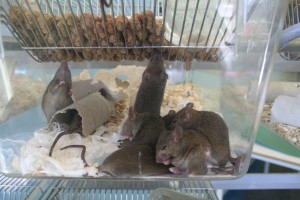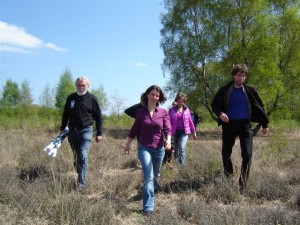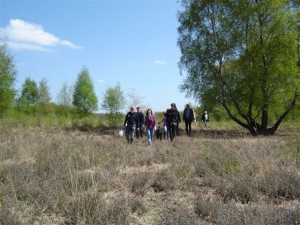Worldlog Semana 21 – 2013
Una maravilla! Hemos podido recuperar casi 100.000 metros cuadrados de la naturaleza más vulnerable del país. Logramos comprarla en la subasta de ‘Staatsbeheer’ (Protección de Bosques). En 2,5 semanas recogimos un cuarto de millón de euros a través de mensajes en los medios sociales, anuncios de radio y el apoyo del programa de radio ‘Vroege Vogels’ y con la ayuda de nuestros propios miembros. Hemos logrado proteger así la naturaleza más vulnerable contra el mercado. A nuestro entender esta ha sido la iniciativa de ciudadanos más grande en el campo de la venta de naturaleza que se ha dado hasta ahora. Más información sobre la subasta de la naturaleza y nuestra acción puedes encontrar en mis Worldlogs de las dos semanas pasadas.
Me alegra ver que tantos conservacionistas de la naturaleza se han unido en esta protesta positiva para salvar pedazos de naturaleza vulnerable. El hecho de que hemos recogido una cantidad tan grande de dinero en tan poco tiempo indica que las personas toman muy al pecho la destrucción de la naturaleza. El Partido para los Animales si tendrá que seguir oponiéndose – dentro y fuera del parlamento – a la continuación de la venta de la naturaleza. Un gobierno que indique no valorizar la naturaleza más que el precio de su suelo si conoce el precio pero no el valor de la naturaleza. Esta declaración maravillosa de John Sawhill es totalmente aplicable a este caso: A society is defined not only by what it creates, but by what it refuses to destroy.
El hecho de que hemos hecho la oferta más alta a un numero de lotes lamentablemente no es una garantía que el partido realmente adquiera la naturaleza comprada. Después de la fase final de la subasta sigue todavía hasta el 24 de mayo la fase para el permiso correspondiente. El actual propietario tiene que otorgar al nuevo propietario los lotes de naturaleza. A continuación!
La semana pasada pregunte en el debate sobre los experimentos con animales al Secretario del Estado de Asuntos Económicos para invertir junto con la industria, el mundo académico, la educación y la comunidad en alternativas a los experimentos con animales. La oficina de investigación ZonMW previamente dejó claro que para el 2025 el uso de animales para la experimentación podría reducirse con un 40 por ciento y que con esta podría ser mejorado la calidad de la atención de salud mejorará y que se promoverá el empleo.
Las cifras más recientes demuestran que el número de animales de experimentación se ha aumentado con un 2,5 por ciento en 2011. En tal año había en Holanda más de 1 millón de animales de experimentación y se han hecho experimentos con 589.853 animales vivos. Además de este número de animales todavía hay un medio millón de animales que son sacrificados inmediatamente por no cumplir con los criterios de selección para un experimento.
Hay muchas razones para optar por técnicas sin el uso de animales. Los animales no son personas. De todas las medicinas que se han desarrollado utilizando los experimentos con animales hay todavía un noventa por ciento que queda fuera cuando se hacen pruebas clínicas en los humanos. Se requieren de nuevos modelos para los métodos de tratamiento más eficaces. Mejor concentrarse en esto por la importancia de los animales y de los humanos.
Es cierto que Holanda ha bajado del cuatro al decimo lugar pero todavía estamos en los 10 países con el trato más cruel de los animales. Continuamos haciendo nuestro mejor por lo menos para sacar Holanda de esta lista!
Y conoces tú el precio verdadero de una hamburguesa? Mira esta película para descubrir todos los costos ocultos de una hamburguesa
Unas fotos espectaculares en The Big Picture de Boston Globe! Esta vez un foto reportaje del National Geographic Traveller 2013.
Hasta la semana entrante, Marianne
Wonderful! We managed to buy the freedom of almost 100,000 square meters of the most vulnerable nature at the auction of Staatsbosbeheer! In 2.5 weeks’ time, we managed to raise a quarter of a million Euros by social media calls, radio spots and support from the radio show Early Birds, and our own members. By doing so we are protecting the most vulnerable nature values against the market. As far as we know, it was the biggest citizens’ initiative ever to buy nature. More information about the nature auction and our action can be found in my Wordlogs of the past two weeks.
I am really pleased that so many nature protectors supported our positive action to save the weak plots of nature. The fact that we managed to raise so much money in such a short time shows that people are concerned about the deterioration of nature. But the Party for the Animals will continue to oppose to the further sale of nature, inside and outside Parliament. A government that shows not to value nature more than the price of the ground it is on, is obviously a government that knows the price but not the value of nature. The great quote by John Sawhill fully applies to this case: A society is defined not only by what it creates, but by what it refuses to destroy.
Being the highest bidder is unfortunately no guarantee that the Party will actually obtain the plots of nature. After the descending price process at the auction, the awarding process is on until the 24th of May. The current owner, the National Forest Service, has to award the plots to the new owner. To be continued!
In the debate about animal testing last week, I asked the State Secretary of Economic Affairs to jointly invest with the industrial sector, academic world, education and social organisations in finding alternatives for animal testing. Research Agency ZonMW recently made clear that the use of test animals can be reduced by 40 per cent in the year 2025, and that the quality of healthcare and the employment will improve as a result.

Most recent figures show that the number of test animals in the Netherlands has risen by 2.5 per cent in 2011. In that year, there were more than one million test animals in the Netherlands and 589,853 experiments were carried out on live animals. In addition to this number of animals, there are another half a million animals that are put down immediately in test animal laboratories, because they, after breeding them, do not meet the selection criteria for a test.
There is every reason to aim for animal test-free technologies. Animals are not humans. Approximately ninety percent of all medicines developed with animal testing drop out when tested on humans by means of clinical trials. New models are needed for more effective treatment methods. Let’s aim for that in the interest of humans and animals.
It’s true that the Netherlands has dropped from the fourth to the tenth place, but we are still in the top 10 of countries that are most cruel to animals. We will continue to do our best to get the Netherlands out of this top 10!
And do you know what the real price is of a hamburger? Watch this short film to discover all the hidden costs of a hamburger.
And again some breathtaking pictures at the Big Picture of The Boston Globe! This time it is a photo report of the National Geographic Traveller 2013.
See you next week, Marianne


